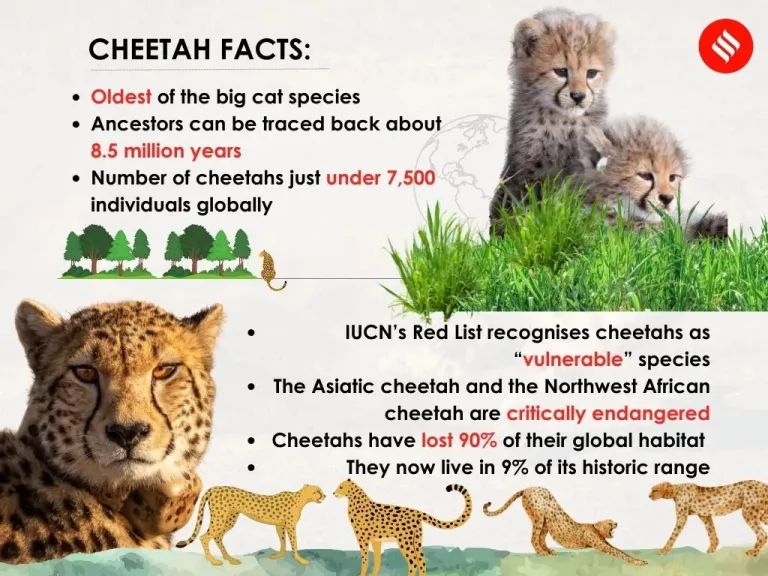
Context
A report by the Accountant General of Madhya Pradesh has flagged concerns over the management of Project Cheetah in Kuno National Park, highlighting a “lack of coordination” between central and state authorities departments.
Project Cheetah
- Project Cheetah is India’s cheetah relocation programme. As a part of the undertaking, 50 cheetahs will be delivered in various National Parks over 5 years.
- The cheetah was officially declared extinct with the aid of the Indian authorities in 1952.
- In total, 20 adult African cheetahs were imported thus far and have been relocated in Kuno National Park.
- This is the first time in the world that a large carnivore has been relocated from one continent to another.
- The first batch of eight cheetahs arrived in September 2022 from Namibia and every other batch of 12 cheetahs from South Africa arrived in February 2023.
- Since their arrival in India, 8 adult cheetahs, 3 females and 5 adult males, have died.
- 17 cubs have been born in India, with 12 surviving, bringing the total number of cheetahs, which includes cubs, in Kuno to 24.
Concerns raised in record
- The audit flagged that there was no point out of cheetah reintroduction in the work plan and management plan, and that there are no documents detailing where the cheetah reintroduction work started and the way it started out.
- From 2021-22 to January 2024, Rs 44.14 crore was spent on Project Cheetah, which was found to be not according to the approved management plan.
- Also unjustified expenditure of over Rs 90 lakh was flagged under hard work prices. However machines were used instead of manual labor resulting in higher costs and a loss of employment for local workers.
- The audit discovered that ground staff and the Kuno Wildlife Division had been not concerned in the site selection or the cheetah reintroduction study, elevating issues about the planning and coordination at the ground level.
- As per the approved management plan, Kuno Wildlife Sanctuary was recognized as the second habitat of Asiatic lions (aside from Gir forest in Gujarat).
- However, no efforts had been made to reintroduce Asiatic lions.
- The report found out that the former Divisional Forest Officer (DFO) of Kuno, was despatched to South Africa and Namibia for cheetah management training but was transferred soon after, making his knowledge unavailable.
- The audit categorised this expenditure as futile, because the Action Plan mandates trained workforce remain at conservation sites for at least 5 years.
Source: Indian Express
Post Views: 1,858
